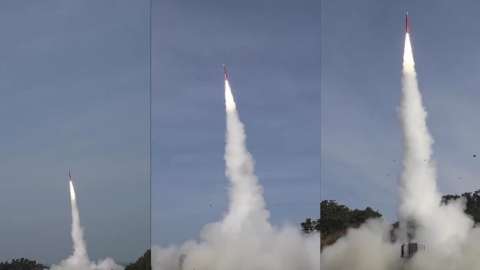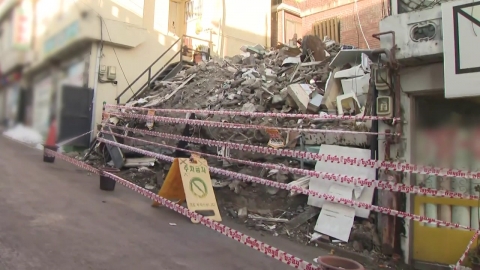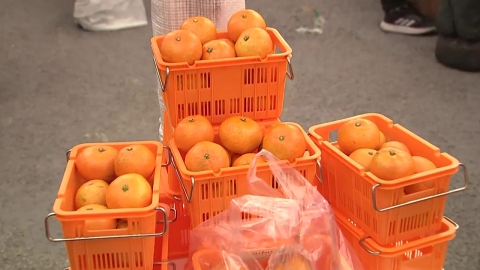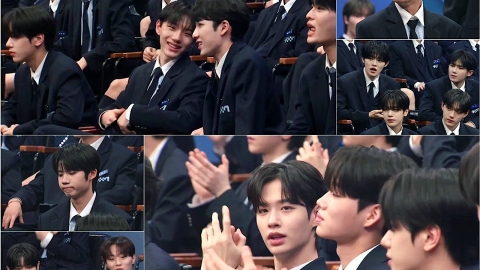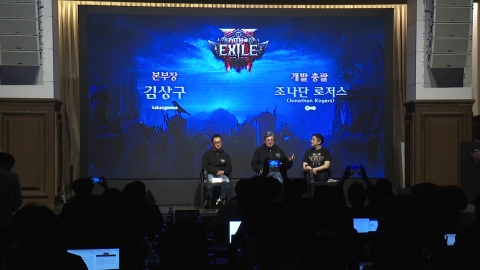■ Starring: Kim Dae-young, researcher at the Korea Institute for National Strategy
* The text below may differ from the actual broadcast content, so please check the broadcast for more accurate information. Please specify [YTN Newswide] when quoting.
[Anchor]
Chairman Kim Jong-un met with the Russian Defense Minister who visited North Korea and reaffirmed his support for Russia.
On the other hand, it is known that the Ukrainian envoys recently visited South Korea and asked for weapons support. Let's take a look at the relevant information with Kim Dae-young, a researcher at the Korea Institute for National Strategy. Hello.
The Russian defense minister visited North Korea yesterday. Visit at this point in time, what can we point to?
[Daeyoung Kim]
In fact, the war in Ukraine has been going on for 1,000 days, and in a way, the war is facing a new inflection point, but Russia or Ukraine is now considering the end of the war, and that's why we're fighting very intense battles on each front. In such a situation, the fact that the Russian defense minister visited North Korea means that Russia also has to wage another large-scale battle for the end of the war. It seems that this is to create a kind of opportunity to receive additional support from North Korea for troops and weapons.
[Anchor]
Chairman Kim Jong-un reportedly met with the Russian Defense Minister who visited North Korea, so wouldn't it be considered that he once again confirmed his support for the Russian war?
[Daeyoung Kim]
That's right. One of the things that Russia is having the most difficulty with right now is that it also supported the territorial settlement policy, but now Ukraine has taken away Kursk and the Russian mainland. This also needs to be recovered, and the other thing is to occupy advantageous areas in preparation for the end of the war. That way, we can continue to exert influence after the end of the war, and in that regard, North Korea seems to have taken such a position that it supports Russia's method or strategy of conducting such a war.
[Anchor]
Some predict that additional troops may be sent through the Russian defense minister's visit to North Korea. What do you expect?
[Daeyoung Kim]
It seems that it can be done enough. In fact, the situation of the war in Ukraine is similar to the end of the Korean War in the past. In the case of areas where both sides are important now, they are trying to occupy at the expense of a large number of people, and one of the problems the Russian military is currently experiencing is the problem of troops. And we need to get these replenished quickly because a lot of weapons are running out now. I saw something unusual a few weeks ago that North Korea was called a long-range artillery gun, so 170mm self-propelled guns and 240mm self-propelled guns. These are actually weapons that were prepared to make the sea of fire in Seoul and the metropolitan area. But we are supporting these things to Russia right now. Then, you can send not only simple weapons support but also operating troops. Then maybe the size of the dispatch could be bigger. Another thing is that if you support the weapon, you will have to send the technicians involved in it. Then, if weapons aid increases in the future, more people will have to go to Russia, and these are likely to intensify in December, especially because there are rumors that President Putin has ordered that Kursk be occupied or re-occupied before the second Trump administration is launched.
[Anchor]
Then, if you ask for support like that, there is a possibility that North Korea will also actively take action, but wouldn't North Korea actually try to receive something if it gave you something? What should I get? I think there will be high-tech support or something like that.
[Daeyoung Kim]
First of all, if you look at the background of North Korea's decision to send troops, you have to pay monthly salaries. Then, as it is usually known, troops brought by Russia as mercenaries from abroad are known to receive at least $2,000 a month. If you calculate that with 15,000 people now, it could be about 30 million dollars, which means North Korea can receive more than 40 billion won a month. Of course, I'm not going to give all the money to the soldiers who sent the troops. I would take 80 to 90% of them, but for North Korea, I have a means to earn a huge amount of foreign currency. In addition, direct technical support is available for North Korea's difficulties in weapons development, but for example, technical advisors can also inform them through indirect support methods. And another thing is that in the case of North Korea, the air force is relatively weaker than ours, so the fighters we have are usually more than 30 years old even if they are new fighters. So there's a possibility that we could ask Russia for these fighter jets.
[Anchor]
However, as far as I know, military support will take full effect only when the ratification is exchanged. I haven't heard anything about this yet.
[Daeyoung Kim]
Normal countries usually have a structure in which treaties are concluded by exchanging ratifications, but now, in fact, both countries are going in an abnormal format, and both Russia and North Korea, especially now, need each other exquisitely, so it doesn't seem to give much meaning to the ratification in that respect. So, regardless of the ratification, it seems that the two countries will provide more mutual support in the future than they do now.
[Anchor]
On the other hand, Russia has recently raised the level of air strikes against Ukraine, and President Putin's remarks suggest the possibility of beheading the leadership by mentioning the nuclear word. How do you see it, whether it's just words or if it's really intentional?
[Daeyoung Kim]
It appears that there is an intention. In the case of removing the leadership, it should have been done in 2022. It's one of the combat processes that you have to do with the outbreak of war, and because Russia actually overlooked this and carried out the war, a lot of steps were twisted in conducting the war. I think it will be over anyway next year. However, for that to happen, Russia or Ukraine must be in a favorable situation for each other. The fact that President Putin has even brought up the removal of the leadership seems to send a message that Russia will have a more advantage in the end-of-war negotiations.
[Anchor]
I'll take the advantage, as soon as possible.
On the other hand, a delegation of special envoys from Ukraine recently visited South Korea. It is known that we have asked our government for weapons support, but our government seems to be avoiding mentioning it when it comes to weapons support. What do you think is the background?
[Daeyoung Kim]
It's probably related to the second Trump administration. In the case of President Trump, he said that he would end the war against Ukraine with a phone call within 24 hours from the past election. And overall, the diplomatic and security lines are being selected, and if you look at it, those people also expressed their position to end the war as soon as possible. Therefore, from our government's point of view, of course, it is very serious that North Korea sent troops to the war in Ukraine, and if Russia can threaten us in the future through the transfer of military weapons or such technologies, and if such technologies are transferred to North Korea. In fact, support for lethal weapons came out in the beginning, but one of the reasons why it continues to subside now is that we don't know the direction of the second Trump administration yet, so it is presumed that we are trying to follow that direction.
[Anchor]
Do you think Ukraine will have weapons on our side as well? There are talks about K9 and Naokcheon Palace, so what weapons do you want in particular?
[Daeyoung Kim]
Some media outlets say that they will unexpectedly purchase things like K9 self-propelled guns, Cheonmu, and Cheongung 2, a surface-to-air missile. Until now, it had been on the support side, but now Ukraine is talking about purchasing it. I think this is also something we need to pay attention to. Because countries that support weapons to Ukraine now actually have fewer and fewer weapons to support now. Because of that, there is a part where money replaces this. So relatively now, Ukraine can afford to buy weapons. But what's wrong with the weapons that Ukraine wants, especially the weapons that our country wants, is that in 2022, as you know, our country exported a huge amount of weapons to Poland. So now each defense company is full of production lines. There are export volumes and supplies that need to be delivered to our military. So it's not easy to make new ones and give them to you. And it takes a lot of time. Another thing is that even if we give weapons, it takes a very long time to train. And one more thing, most importantly, it's hard to sell this because we don't know which way the second Trump administration will end the war. The Korean government's position is quite embarrassing, especially in the case of the Ukrainian government, it is showing Korea's weapons through their social media yesterday and even sending out videos such as jackpot and so on. On the other hand, the Korean government's position is actually ambiguous, so how to soothe the Ukrainian side is a very important situation.
[Anchor]
Your interests are complicated.
[Anchor]
However, President Yoon expressed his intention when he met with the special envoys of Ukraine and sought effective countermeasures for military cooperation between North Korea and Russia. In the current situation, what response cards can we use with Ukraine?
[Daeyoung Kim]
The current situation seems to be very embarrassing from the government's point of view. I didn't know that the results of the U.S. presidential election would have such an impact. In that regard, it seems that we are in the dilemma of what kind of support we should provide to Ukraine in the future, and if that happens, isn't it that we are still continuing humanitarian aid related to non-lethal? That's why it seems right to focus more on humanitarian support for now. As you know, many power generation facilities and energy production facilities in Ukraine are being hit hard by Russian airstrikes. For example, large-scale generators that can make electricity are one of the things that Korea makes well, so we need to think about supporting these things. Rather, I would like to say that the direction of increasing humanitarian aid can be a new card.
[Anchor]
The government has raised the need to send observers, but how do you see the need in this regard?
[Daeyoung Kim]
In fact, we need to see what the North Korean military does because the North Korean military participated in the war in Ukraine. So the need to send observers is considerable. However, since this is a problem in the National Assembly right now, how can the government persuade the opposition party well? And another thing, if not immediately, it is expected that there will be more North Korean troops participating in the war, casualties on the front lines, and even more cases of defecting or being captured if the situation worsens. Then, there may be people who say that North Korean soldiers will come to South Korea. That's why I think it's right for us to send an observation team to the Ukraine match, whether indirectly or somehow, even a small number.
[Anchor]
President-elect Trump nominated Kellogg, the former vice presidential national security adviser, as the special envoy for Ukraine and Russia, so this person becomes the special envoy in charge of ending the war in Ukraine. How do you expect to proceed in the future?
[Daeyoung Kim]
There are a lot of talks about the end of the war in the direction of a ceasefire like the Korean War. It can be said that there are quite a lot of variables. For example, President Trump says he will finish the election process in 24 hours, but now Russia and Ukraine have different positions, and of course, they agree to a large extent on the end of the war. Even the Ukrainian people, according to a poll, are saying that more than 50% of them should end the war, but for example, it took more than a year or two to cease the ceasefire just by looking at the Korean War. That's why it's not easy. No matter how good the U.S. is at mediating. Still, it could go wrong during the negotiation process. That's why I'm very concerned about that right now. As President Trump said, it is quite questionable whether the end of the war can be completed as soon as possible.
[Anchor]
As you said, we need to see how the Trump administration will come out, but do you think Putin will have no choice but to welcome the end of the war? What kind of dialogue do you think is necessary for the end of the war in Ukraine to happen quickly?
[Daeyoung Kim]
We have to find a compromise. However, there are many proposals that President Putin now thinks are very difficult to accept from Ukraine's point of view. In 2022, the two sides met in Belarus and held various talks, but if you look at the conditions Russia offered at the time, aren't there pro-Russian regions on the Ukrainian side? In addition to that, give more territory as a plus alpha. Additionally, the number of Ukrainian troops and weapons must be restricted. This is unacceptable to Ukraine. And Ukraine also suffered enormous victims through the war, so we can't accept all of Russia's opinions in that regard 100%. And Ukraine also has its own position. Then Ukraine should also receive some security guarantees, and it is now controversial what kind of card the U.S. will offer and whether Ukraine will accept it.
[Anchor]
I'm also curious about how the European Parliament sees the situation now, but first of all, they condemned Russia's military cooperation with North Korea and indirectly urged South Korea to support Ukraine. What do you think of the situation now?
[Daeyoung Kim]
The U.S. and Europe have different opinions now. In fact, in a way, one of the horrors that Europe has now is that even after the war in Ukraine, Putin could start a war once again. Of course, it won't be right away, but I'm alarmed that five years later, four years later, another war could start. So, it's good to have peace simply, but the security of Europe as a whole should not be shaken by peace. On the other hand, the new Trump administration, which will be launched now, only intends to end the war as soon as possible. These two opinions are slightly in conflict with each other. So, in the case of Europe, I want South Korea to provide weapons support, while the diplomatic and security lines of the second Trump administration are unlikely to do this. Because some view it as not very helpful in the past, it's quite an embarrassing situation for us, and the other thing is that it's like a storm before the inauguration of the second Trump administration. We still don't know what kind of U.S. content will come out during the second administration. That's why the whole world is actually anxious about it. Because of that aspect, I think the Korean government also needs to review various scenarios to see what plans will come up with in relation to the second Trump administration, especially the Ukraine war.
[Anchor]
In terms of the EU itself, how can the EU itself see the Ukraine war as an advantage now?
[Daeyoung Kim]
It is right to go in the direction that is preferably in Ukraine's favor. Ukraine will definitely have an end-of-war plan. In particular, the part of how to secure security is very large, and in that respect, Europe is in a bit of a hurry because it has to create such a situation favorable to Ukraine.
[Anchor]
Then, finally, you said that some scenarios should be established on how our government should respond to the current situation, so please tell us your opinion on which direction will be wise.
[Daeyoung Kim]
First of all, the second Trump administration has a very strong aspect of rushing the end of the war, but there is a very high possibility that it will not work out as expected. If that happens, the second Trump administration could also temporarily provide more weapons aid to Ukraine to drag Russia toward the United States as an advantage in the negotiations. In that case, we might take the opportunity to provide the weapons of killing that Ukraine really wants, or the U.S. should continue to focus on humanitarian aid. Then, I think we should consider prioritizing humanitarian support, focusing on power facilities and generators that are currently being hit a lot.
[Anchor]
I pointed out with Kim Dae-young, a researcher at the Korea Institute for National Strategy, how the next Trump administration will come out on the Russia-Ukraine war and what Korea's position is. Thank you.
※ 'Your report becomes news'
[Kakao Talk] YTN Search and Add Channel
[Phone] 02-398-8585
[Mail] social@ytn. co. kr
[Copyright holder (c) YTN Unauthorized reproduction, redistribution and use of AI data prohibited]
International
More- Bank of Japan Governor "Nearly raising interest rates"
- When asked if Russia could resume nuclear tests, Deputy Foreign Minister said, "Consider it in every way."
- Food poisoning of 300 people who bought and ate anti-American sandwiches at Vietnamese food stalls...One person died.
- Trump's disagreement over the end of the war in Ukraine..."Stop supporting" vs "No surrender".

